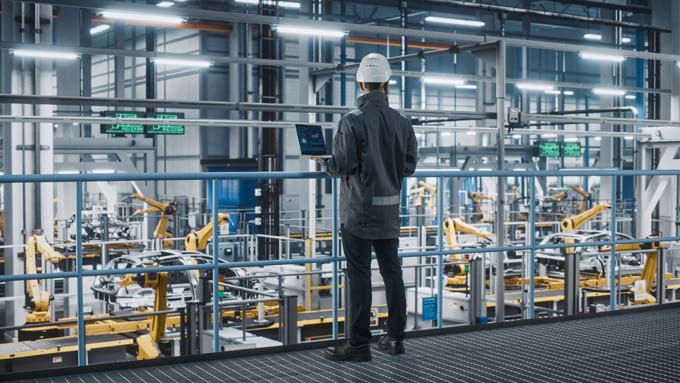AI is revolutionizing industries: Five industry trends for 2025
Artificial intelligence will fundamentally change the industrial landscape in 2025. Jürgen Hindler, Senior Manager Sales Development & Strategy - Supply Chain Management at Oracle, explains five key trends that companies should consider in order to avoid being left behind in the digital transformation.

Automotive industry: The digital reinvention
The automotive industry is undergoing a technological upheaval. In view of the complex challenges - from electromobility and global competition to stricter regulatory requirements - AI is becoming an indispensable key technology. It is optimizing supply chains and production logistics while revolutionizing customer interaction.
A possible future scenario: in the future, car manufacturers could guide customers digitally through the entire production process of their vehicle - from the initial order to the so-called "marriage", where the chassis and drive are joined together in assembly. Crucial to this vision is a robust database in the cloud that enables a seamless exchange of information between systems and provides data in real time. Without this foundation, the use of AI threatens to remain inefficient and ineffective.
Chemical industry: sustainability meets efficiency
The chemical industry is facing complex challenges: high energy costs, strict environmental regulations and enormous global pressure to innovate. This is where AI unfolds its enormous potential by setting the course for more sustainable processes and radically optimizing the use of resources.
Predictive maintenance is a particularly promising field of application. AI can be used to identify potential machine problems at an early stage, prevent unplanned downtime and plan repairs with precision. A prime example is the company Noble Plastics: the system uses AI-supported analyses of tool wear data to provide precise warnings for optimal maintenance. This prevents faulty products and simultaneously reduces costs through smarter planning.
Mechanical engineering: digitalization as a lifeline
One of the biggest challenges in mechanical engineering is still dormant: the sluggish digitalization of many production facilities. Many companies still work with isolated systems or rely on paper-based processes - a situation that makes the introduction of modern technologies much more difficult.
AI can build the crucial bridge here by automating processes, shortening development times and increasing product quality. Simulations and data-based models are used to make processes more efficient and generate more precise results that secure real competitive advantages.
The example of Bosch shows what successful AI integration can look like: In a service center with over 200,000 customer inquiries a year, AI-based systems provide lightning-fast answers and solutions to highly complex problems. This significantly increases the quality of interaction between customers and the company.
Energy sector: AI as an accelerator of the energy transition
The energy sector is facing enormous challenges that require a far-reaching transformation. Regulatory uncertainties, fluctuating security of supply and the immense pressure to decarbonize require innovative solutions. This is precisely where AI is becoming a key technology: it enables more precise control of energy flows, accelerates the expansion of renewable energies and optimizes existing grids with a level of efficiency that would have been unthinkable just a few years ago.
Construction industry: autonomous systems conquer major projects
A pioneering example of the transformative power of AI can be found in the construction industry in China. There, a highway was built fully automatically over 160 kilometers - a flagship project that impressively demonstrates the possibilities of autonomous systems in combination with AI. The development is convincing proof that AI technologies can be used in both small and large-scale infrastructure projects.
Cloud technology: the invisible foundation for AI success
Irrespective of specific industries, the cloud is proving to be a decisive success factor for AI applications. It creates the technological infrastructure for storing and processing huge amounts of data and forms the basis for real-time applications. Whether in the supply chain, customer service or product development - without the cloud, AI projects often remain piecemeal.
Western Digital provides a meaningful practical example: AI is used there to predict the arrival times of deliveries with precise accuracy. The real-time data makes it possible to make subsequent processes such as resource planning and transportation management significantly more efficient. Such applications vividly illustrate how the combination of cloud and AI can sustainably increase the competitiveness of companies.
Looking to the future: AI as an indispensable corporate strategy
Although AI has already become the standard in many areas, the real revolution is yet to come. The automotive industry is already experimenting with AI-controlled design processes for new hybrid drives. In the chemical industry, intelligent systems are being used to achieve ambitious sustainability targets. The mechanical engineering industry is using AI to navigate complex global supply chains.
In 2025, AI will no longer be just one option among many. Rather, it will become a central component of any corporate strategy that is geared towards long-term success and competitiveness. Those who do not invest in AI technologies and the necessary cloud infrastructure now risk being left behind.
Unmistakable message: the AI revolution cannot be stopped - it is already in full swing.
Source: www.oracle.com









